Transactional Analysis (or TA as it is often called) is a model of people and relationships that was developed during the 1960s by Dr. Eric Berne. It is based on two notions: first that we have three parts or ‘ego-states’ to our ‘personality. The other assumption is that these converse with one another in ‘transactions‘ (hence the name). TA is a very common model used in therapy and there is a great deal written about it.
Communications (Transactions)
When two people communicate, each exchange is a transaction. Many of our problems come from transactions which are unsuccessful.
Parents naturally speak to Children, as this is their role as a parent. They can talk with other Parents and Adults, although the subject still may be about the children. The Nurturing Parent naturally talks to the Natural Child and the Controlling Parent to the
Adaptive Child. In fact these parts of our personality are evoked by the opposite. Thus if I act as an Adaptive Child, I will most likely evoke the Controlling Parent in the other person. We also play many games between these positions, and there are rituals from greetings to whole conversations (such as the weather) where we take different positions for different events. These are often ‘pre-recorded’ as scripts we just play out. They give us a sense of control and identity and reassure us that all is still well in the world. Other games can be negative and destructive and we play them more out of sense of habit and addiction than constructive pleasure.
Conflict
Complementary transactions occur when both people are at the same level. Thus Parent talking to Parent, etc. Here, both are often thinking in the same way and communication is easy. Problems usually occur in Crossed transactions, where the other person is at a different level. The parent is either nurturing or controlling, and often speaks to the child, who is either adaptive or ‘natural’ in their response. When both people talk as a Parent to the other’s Child, their wires get crossed and conflict results.
The ideal line of communication is the mature and rational Adult-Adult relationship.
So what?
Being a Controlling Parent can get the other person into a Child state where they may conform with your demands. There is also a risk that they will be an Adaptive ‘naughty child’ and rebel. They may also take opposing Parent or Adult states. Be a Nurturing Parent or a talk at the same level as the other person to create trust. Watch out for crossed wires. This is where conflict arises. When it happens, first go to the state that the other person is in to talk at the same level. For rational conversation, move yourself and the other person to the Adult level.
Transactional Analysis and Communication
Transactional analysis or TA is a branch of psychotherapy developed by Eric Berne. His definition of it is “a theory of personality and a systematic psychotherapy for personal growth and change”.
Knowing about TA can be very useful for improving our communication skills. TA is about how people are structured psychologically and is both a theory of communication and a theory of child development.
Berne’s model is a three part ego-state model. An ego state is
- “A consistent pattern of feeling and experience directly related to a corresponding consistent pattern of behaviour”.
There are three ego states in Berne’s model: - Parent,
- Adult,
- Child.
Ego states are irrespective of age and are capitalized to differentiate from the normal use of the words parent, adult and child.
The Parent and Child ego states are echoes of the past. The Adult ego state is a response to the here and now when a person is grown up and using grown up responses. Ego states are ‘things’ not names. They are a set and related; thoughts, feelings and behaviours.
Communication between people can be from one ego state to a different one or from one ego state to the same ego state.
Normally communication will be from one ego state either to the same ego state or a different one. The person who first communicates will expect a reply to be from a certain ego state. If communication is from a different ego state to the expected one, then the communication may be ineffective and the message may be lost, not received or disregarded by the person receiving it. If communication is from Adult to Adult then it is likely to be the most effective communication for most of our communications.
The ‘3 Rules of Communication’ in TA
1st Rule of Communication
So long as transactions remain complementary, communication can continue indefinitely.
2nd Rule of Communication
When a transaction is crossed, a break in communication results, and one or both individuals will need to shift ego states in order for the communication to be reestablished
3rd Rule of Communication
The behavioural outcome of an ulterior transaction (one where two messages are sent at the same time; one overt social and one covert psychological) is determined at the psychological level and not at the social level.
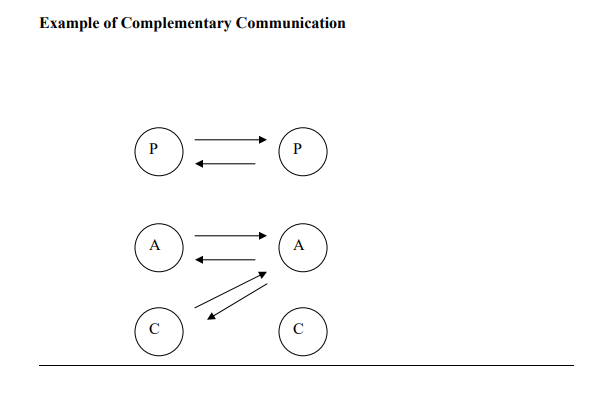
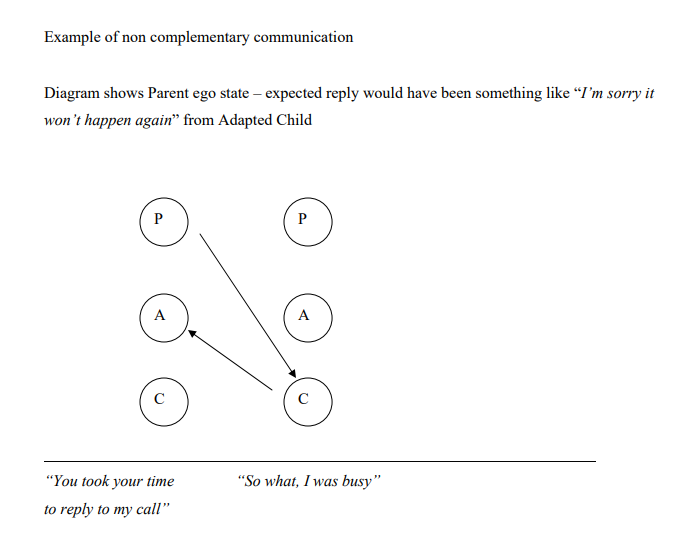
The ego states are sub-divided.
Parent ego state is divided into:
- Parent into Critical Parent CP – which is negative, unsupportive, critical.
- Nurturing Parent NP – which is supportive, helpful, nurturing, comforting.
Child ego state is divided into:
- Free Child FC (sometimes referred to as Natural Child NC) which is spontaneous, freewheeling, playful, self-indulgent, curious, rebellious.
- Adapted Child AC – which is toned down behaviour that has been learnt in response to the reactions from other people to us and our behaviour. The learned or adapted responses are more likely to generate a given result from the receiver.
The 3 ego states can be used as a way of analysing transactions (communications) between people. A transaction is a communication from A to B and the response from B to A.
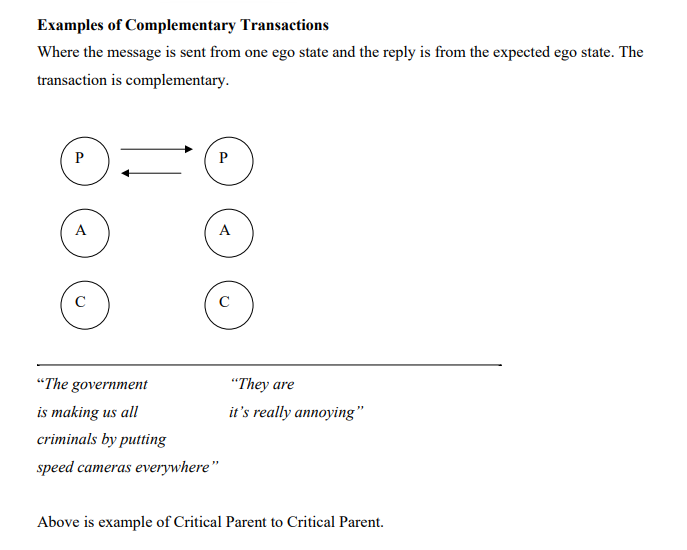
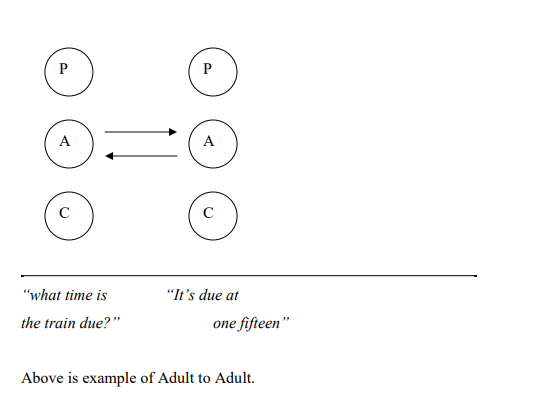
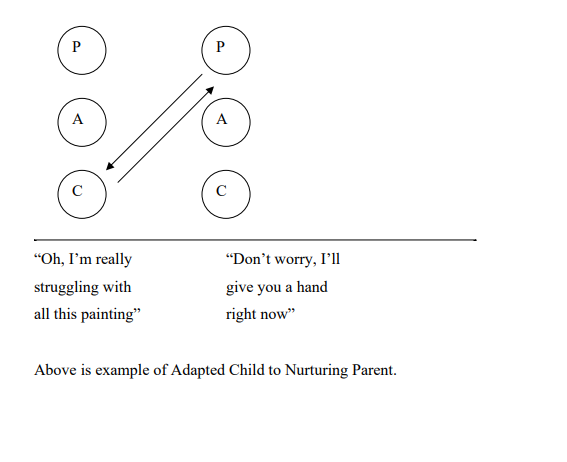
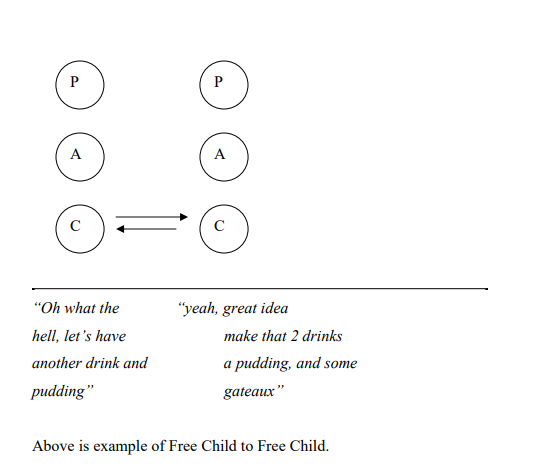
Using TA For Effective Communication
For effective communication you need to keep the transaction complementary i.e. focus on sender to receiver and receiver to sender where the message is sent to the ego state from which you expect a reply. Using ego states we can look at how others communicate and how we communicate with others. It’s possible to identify which ego state we are in and which ego state we are expecting a reply from.
We can also use TA to help us plan transactions. For example we can identify which ego state would be most valuable for us to send the message from and which ego state it would be better for it to be received by. If we receive a reply from the wrong (non expected) ego state then we can either try to shift the other person’s ego state; or if we cannot do this it may be better to stop the communication and try again another time when the person may be in a different ego state. We can listen to people’s communication to identify if they are habitually in one ego state and then decide if communication to that ego state would be appropriate or not. TA therefore can be used to elicit the reactions you want from other people (and this will happen consciously or unconsciously).
We can help communication if we need to by trying to shift the other person’s ego state by inviting people to move into a different ego state (they may not always move into it though, particularly if someone is habitually in one ego state). Do this by acknowledging their current ego state (by the appropriate message or response) and then invite them into another ego state by the words (and body language) which you use.
Invite them to move into Adult by:
- Asking a question
- Stating a few facts
- Asking for their opinion
- Asking for their preference
- Asking for their view
Invite them to move into Nurturing Parent by:
- Asking for their help
- Asking for their advice
- Asking for their expert opinion
- Communicating your fears/worries
Invite them to move into Natural Child (Free Child) by:
- Being one yourself
- Showing the funny side of the situation
- Going to nurturing parent
- Being enthusiastic
- Showing an unconventional way of looking at things.
TA implies that you can have considerable impact on modifying unsatisfactory behaviour by the way you communicate with others. You use your Adult ego state to think about what behaviour is appropriate. The Adult ego state has the capacity to control the other two ego states.
Playing Games
In ‘Games People Play’ Berne identified that people habitually adopt certain ego states (not necessarily consciously) and “play games” in the way they communicate with others. E.g. a person might say “I’m fat” or “Nobody Loves Me”, they are in Adapted child. They expect a nurturing parent response of “no you are not” or “yes they do”. If they received a response of “I know you are” or “You’re right, everybody hates you” then they have received a reply that they didn’t want. Some people go through life playing a game and people can be in a relationship where one person is the Adapted child and the other the Nurturing parent.
Some people habitually play games and go through life playing games such as:
‘Isn’t life unfair’,
‘Everyone is against me’
‘I am poorly’,
‘I am always right and you are always wrong’
‘It is your fault that I …’
Games typically:
- Are repetitive
- Are played without Adult awareness
- Always end up with players experiencing racket feeling.
- Games entail an exchange of ulterior transactions between the players
- Games always include an element of surprise or confusion.
Racket feeling – a familiar emotion, learned and encouraged in childhood, experienced in many different stress situations, and useless as a means of problem solving but frequently carried out E.g. my computer screen freezes, I get stressed and hit it.
Common games include: “oh how I suffer” “Isn’t it awful” “victim, persecutor, rescuer” and
“If it weren’t for you”
Strokes – units of recognition
Can be: verbal or non-verbal
Positive or negative
Conditional or unconditional
A stroke is a unit of recognition. E.g. you walk down the street and see your neighbour. As you pass you smile and say “hello”. They smile and say “yes, great day?” That’s a positive stroke you’ve given and received.
If your neighbour ignored you then you felt left out or deprived or wonder what you have done to offend them.
Any transaction is an exchange of strokes. This may be entirely non-verbal.
Positive strokes – the receiver experiences it as being pleasant.
Negative strokes – the receiver experiences it as being painful.
For example if your neighbour replied “It was a nice day until I saw you!” then that’s an example of a negative stroke. But any kind of stroke is better than no stroke at all. Stewart and Jones identify that this is supported by work on rats where one group were given
electric shocks and the other group were not. The rats given the shocks developed better – as they were receiving some stimulation.
Conditional strokes relate to what you do.
Unconditional strokes relate to what you are.
E.g. Conditional: “That was a good piece of work”
“That painting you’ve done is a real mess”
Unconditional: “Your humour always brightens things up”
“I hate you and all which you represent”
As infants we test out behaviours to find out which give us the strokes we need. If we receive strokes from a certain behaviour then we are likely to repeat it (and that can be where many of our learnt behaviours come from – albeit unconsciously learnt)
